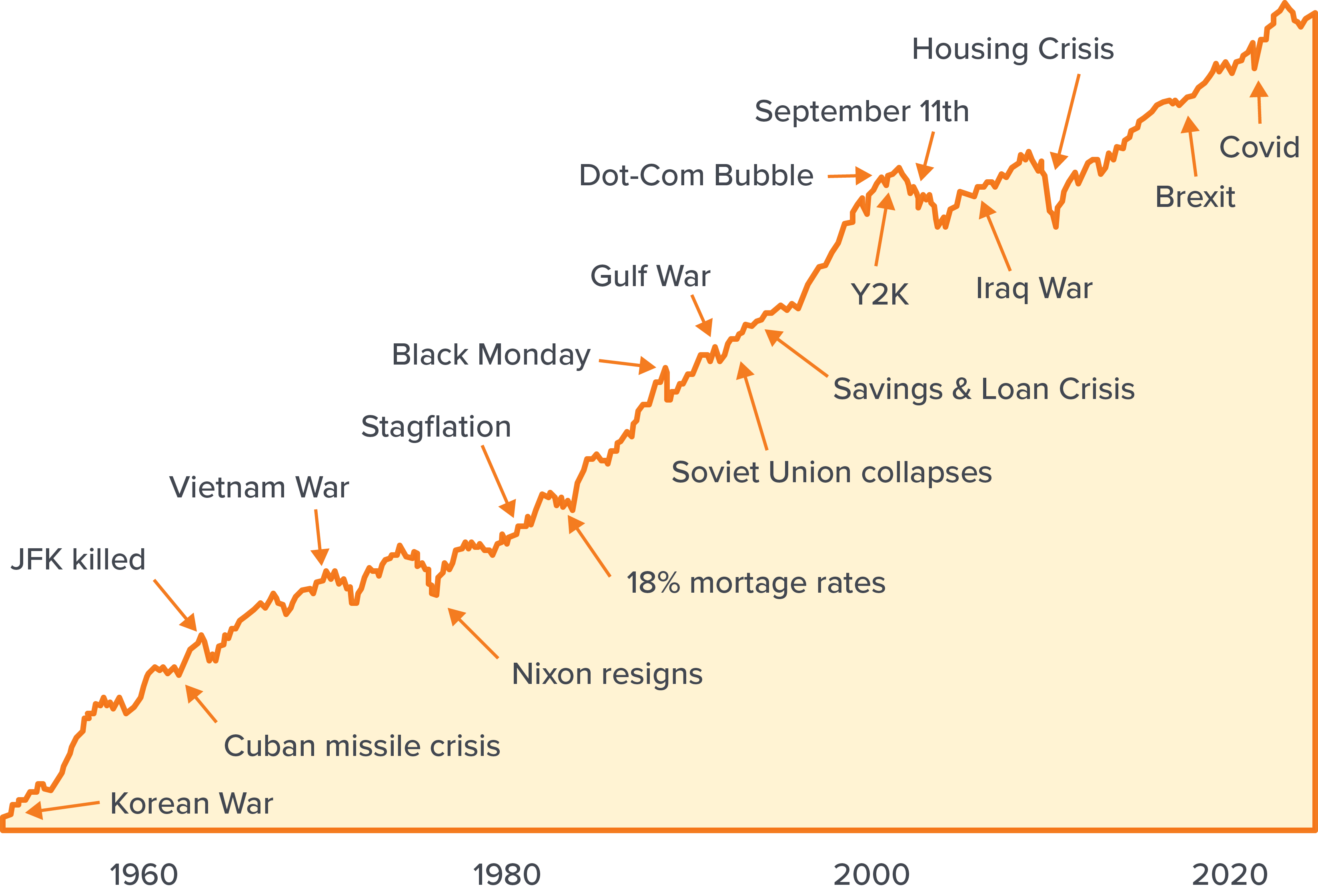Knowledge Center
Investing in Stocks Doesn’t Have to Be Risky
When you don’t worry about the day-to-day ups and downs of the market, investing in stocks can feel like a walk in the park. Updated December 2024.
By David Baskin, Chair, RPB Board of Trustees
Let’s imagine that every day you take your dog for a walk in the neighborhood park. You start in the southwest corner and end up in the northeast corner—pretty much a diagonal line. But of course, you never get there by going straight. Your dog is all over the place, peeing on bushes, checking out other dogs and chasing squirrels. But somehow, you always get to where you wanted to go. In many ways, the stock market is like that dog walk.
On any given day, stocks might go up or down. And then there are confusing days when some stocks will go up while others will go down, and vice versa. Trying to predict what any stock, or even any group of stocks, will do on a given day is impossible. It’s like trying to guess whether your dog will pull you right or left.
But here’s the thing. Just like your daily walk in the park always starts on one corner and ends at the other, stocks move from the bottom left of the page to the top right. Not in a straight line, not every day and not every month, but reliably over time.
There is always a reason not to invest. But the S&P 500 has returned over 10% per year since 1950. |
|
PATIENCE IS THE KEY
Between 1934 and 2024—a 90-year period—stocks were down only four times on average during ten-year holding periods. During the other 86 times (that’s about 95% of the time), anyone who was patient and held a good mix
of stocks without selling for ten years generally made money. Sometimes more, sometimes less. There have been no fifteen-year periods since 1934 during which stocks have, on average, lost value.
The notion that stocks are risky, and that putting money into the stock market is like gambling, is true for some people. If you intend to buy and sell on a daily or weekly basis, you are not very different from someone who goes to the roulette table and bets on red or black. Some days you win, some you lose; it is essentially random. We call those people speculators, not investors.
Investors are people with a longer time horizon, which is the amount of time they have to invest to reach their goal. If a 30-year-old invests with the goal to fund retirement, their time horizon is measured in decades. For long-term investors, returns are not random at all. The “roulette wheel” is tilted in their favor because historically the stock market has gone up over time.
But time horizon isn’t everything. Stocks can also be risky if you invest all your money in only one or just a few stocks. If you’re trying to take advantage of the steady growth of stocks, it’s a good idea to be diversified within your stock portfolio. That means owning a mix of stocks across different industries, different sized companies, and even different countries.
The quality of the companies you invest in matters, too. While small, speculative stocks can sometimes make eye-catching gains, it is safer and wiser to hold well-established profitable companies. The managers hired by RPB to buy and sell securities for our participants are focused on these kind of “blue chip” stocks.
The real risk for many long-term investors is missing out on the superior returns that come from investing in stocks. This is a risk economists call “opportunity cost.” So don’t be fooled by the daily ups and downs of the stock market you read about in the paper or see on TV. Over the long term, investing in stocks is not overly risky. History shows that if you have sufficient time, are well diversified, and choose stocks of high-quality companies, it’s among your best possible investment choices.
YOUR RPB INVESTMENT OPTIONS
At RPB, we offer participants three ways to take advantage of the long-term potential of investing in stocks. Read more about your choices.
About the Author
David Baskin has more than 43 years of experience in the finance, venture capital, and investment fields, and is the founder of Baskin Wealth Management in Toronto.
David is a sought-after financial market commentator, frequently appearing on BNN’s Market Call in Canada and other BNN Bloomberg programs, as well as on CBC Radio..
David is a past president of Holy Blossom Temple in Toronto.
- Please note that all investments carry some level of risk, including the potential loss of principal, and past performance is not indicative of future results. There is no guarantee that any investment strategy will achieve its objectives or generate profits. Before making any investment decisions, we recommend that you consult with a qualified financial advisor.


